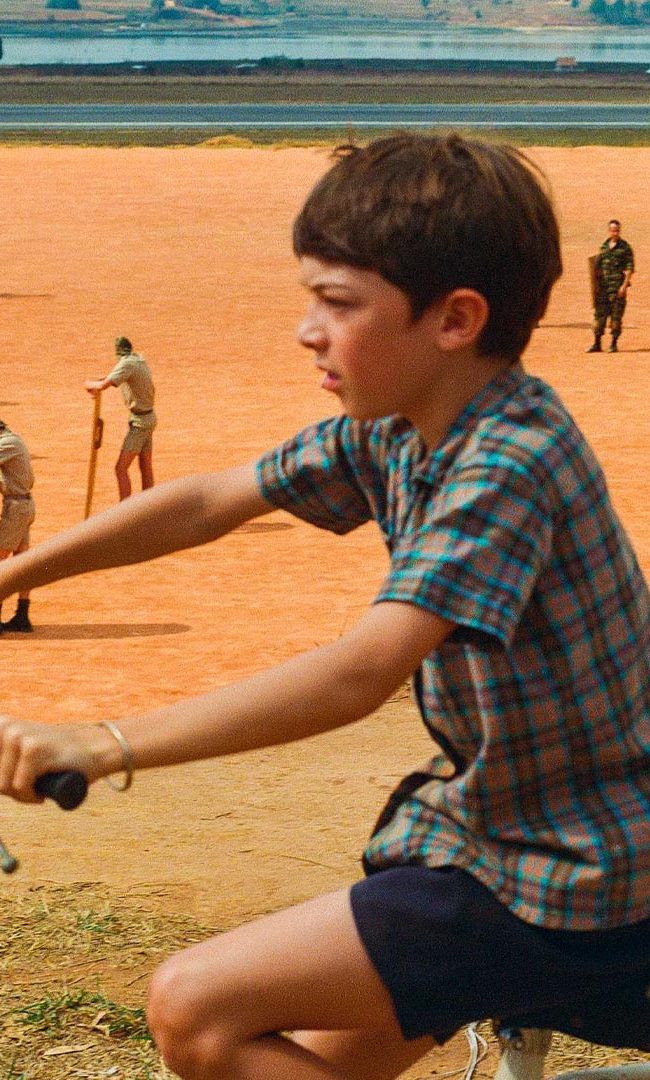RED ISLAND

(Check out Chris Reed’s Red Island movie review, in theaters August 16. Seen it? Join the conversation with HtN on our Letterboxd Page.)
Lying off the southeast coast of Africa, the nation of Madagascar—the fourth largest island in the world—is often referred to as “red” because of the distinctive color that comes from its laterite soil. The indigenous Malagasy population (of various ethnic groups) makes up the majority of inhabitants, though there have also been different foreign residents over the centuries, among them the French, who invaded at the end of the 19th century, turning Madagascar into a colony. It was a comparatively short experiment (though surely no less traumatic for its brevity), the country regaining its independence in 1960.
In Red Island, director Robin Campillo (120 BPM) places his autobiographically inspired narrative in the period just before the last of the French military bases closes in 1972. It’s a time of additional change: until that year, President Philibert Tsiranana—a strong proponent of close ties to France—headed up the First Republic, though he would soon resign amidst student protests. The previous decade had marked a slow transition away from Francophilia. The connections between colonizer and formerly colonized were about to be broken much more widely apart.
Little Thomas Lopez (Charlie Vauselle) is the youngest of three boys, the son of a Spanish-born father and a French mother. His dad, Robert (Quim Gutiérrez, Honeymoon with My Mother), works as a radio operator for the airborne armed services while his mom, Colette (Nadia Tereszkiewicz, The Crime Is Mine), raises the children in their nicely apportioned home. It’s a bit of a terrestrial paradise for the family, with a pleasant climate, lovely beaches, and local servants to tend to their needs.
Thomas is obsessed with Fantômette, the teenage heroine of a French book series for kids. She’s a masked crime fighter who always seems to outsmart and outduel her much older male adversaries. In Red Island, she frequently appears (including in an opening prologue) as a figure of fantasy, dreamed of by Thomas as he struggles to discover his own identity (including, perhaps, that of gender identification and/or eventual sexual orientation). He even, at the end, dresses up as Fantômette for a final nighttime walk-though of familiar locations about to be left behind.
For the bulk of its duration, the movie is filled with scenes of French colonial existence; the empire may have crumbled, but the lifestyle remains. White soldiers behave badly, cheating on their wives either with sex workers or other Malagasy women supporting the troops in various functions (such as folding parachutes), and often drinking too much. Colette and Robert drift apart as she suspects Robert of infidelity, and he responds with ever-more reckless parenting decisions (like gifting his boys a trio of baby crocodiles).
As a sweet reprieve from the grown-up madness, Thomas bonds with Suzanne (Cathy Pham), the daughter of Vietnamese immigrants, who shares his love of Fantômette. Suzanne has some family secrets of her own, it turns out, leading her to utter this profound assessment of the adult world: people hide things. Indeed, they do, and also deny the reality in front of them.
After all the above build-up, Campillo then pulls a dramatic switch, drifting away from the problems of colonizers to focus on the freshly awakened Malagasy people, his camera following a young woman, Miangaly (Amely Rakotoarimalala), who has been having an affair with an alcoholic French officer. Heretofore a minor character, she now emerges into protagonist territory. It’s as if nothing that has come before has mattered (except, perhaps, for Thomas’ own awakening consciousness). Just as in real life, we discard the concerns of the oppressor. The oppressed rise, and the future, though complicated, belongs to them.
– Christopher Llewellyn Reed
Film Movement; Red Island; Robin Campillo











